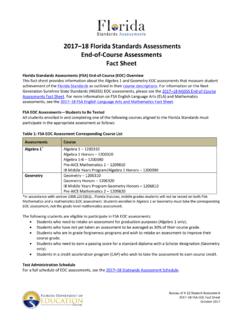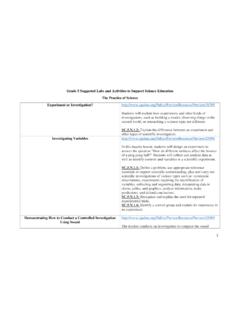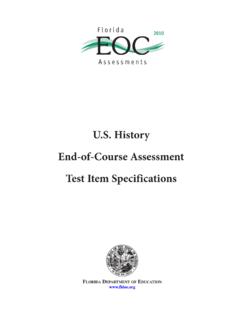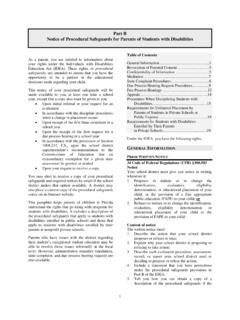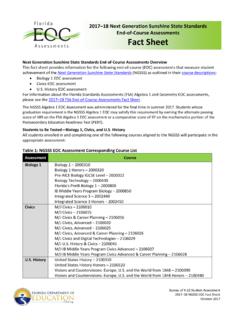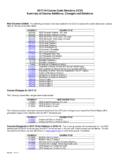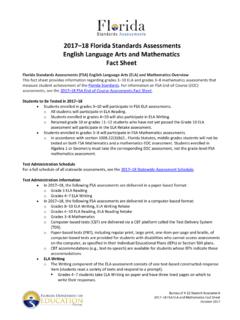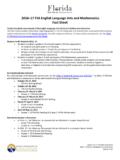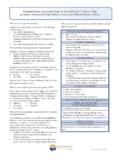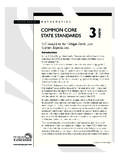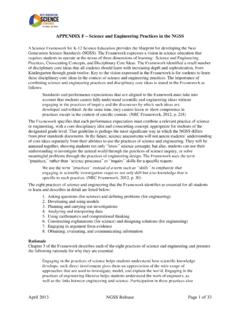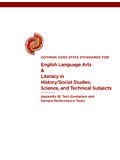Transcription of The Interstate School Leaders Licensure Consortium (ISLLC)
1 The Interstate School Leaders Licensure Consortium ( isllc ). isllc 's Standards for School Leaders : 1. A School administrator is an educational leader who promotes the success of all students by facilitating the development, articulation, implementation, and stewardship of a vision of learning that is shared and supported by the School community. 2. A School administrator is an educational leader who promotes the success of all students by advocating, nurturing, and sustaining a School culture and instructional program conducive to student learning and professional growth. 3. A School administrator is an educational leader who promotes the success of all students by ensuring management of the organization, operations, and resources for a safe, efficient, and effective learning environment.
2 4. A School administrator is an educational leader who promotes the success of all students by collaborating with families and community members, and mobilizing community resources. 5. A School administrator is an educational leader who promotes the success of all students by acting with integrity, fairness, and in an ethical manner. 6. A School administrator is an educational leader who promotes the success of all students by understanding , responding to, and influencing the larger political, social, economic, legal, and cultural context. 1. Educational Leadership Constituent Council (ELCC). Standards for Advanced Programs In Educational Leadership Standard 1: Candidates who complete the program are educational Leaders who have the knowledge and ability to promote the success of all students by facilitating the development, articulation, implementation, and stewardship of a district vision of learning supported by the School community.
3 Develop a Vision a). Candidates develop a vision of learning for a School that promotes the success of all students. b). Candidates base this vision on relevant knowledge and theories, including but not limited to an understanding of learning goals in a pluralistic society, the diversity of learners and learners' needs, schools as interactive social and cultural systems, and social and organizational change. Articulate a Vision a). Candidates demonstrate the ability to articulate the components of this vision for a School and the leadership processes necessary to implement and support the vision. b). Candidates demonstrate the ability to use data-based research strategies and strategic planning processes that focus on student learning to inform the development of a vision, drawing on relevant information sources such as student assessment results, student and family demographic data, and an analysis of community needs.
4 C). Candidates demonstrate the ability to communicate the vision to staff, parents, students, and community members through the use of symbols, ceremonies, stories, and other activities. Implement a Vision a). Candidates can formulate the initiatives necessary to motivate staff, students, and families to achieve the School 's vision. b). Candidates develop plans and processes for implementing the vision ( , articulating the vision and related goals, encouraging challenging standards, facilitating collegiality and teamwork, structuring significant work, ensuring appropriate use of student assessments, providing autonomy, supporting innovation, delegating responsibility, developing leadership in others, and securing needed resources).
5 Steward a Vision a). Candidates demonstrate an understanding of the role effective communication skills play in building a shared commitment to the vision. b). Candidates design or adopt a system for using data-based research strategies to regularly monitor, evaluate, and revise the vision. c). Candidates assume stewardship of the vision through various methods. 2. Promote Community Involvement in the Vision a). Candidates demonstrate the ability to involve community members in the realization of the vision and in related School improvement efforts. b). Candidates acquire and demonstrate the skills needed to communicate effectively with all stakeholders about implementation of the vision. Standard 2: Candidates who complete the program are educational Leaders who have the knowledge and ability to promote the success of all students by promoting a positive School culture, providing an effective instructional program, applying best practice to student learning, and designing comprehensive professional growth plans for staff.
6 Promote Positive School Culture a). Candidates assess School culture using multiple methods and implement context-appropriate strategies that capitalize on the diversity ( , population, language, disability, gender, race, socio-economic) of the School community to improve School programs and culture. Provide Effective Instructional Program a). Candidates demonstrate the ability to facilitate a. activities that apply principles of effective instruction to improve instructional practices and curricular materials. b). Candidates demonstrate the ability to make recommendations regarding the design, implementation, and evaluation of a curriculum that fully accommodates learners' diverse needs. c). Candidates demonstrate the ability to use and promote technology and information systems to enrich curriculum and instruction, to monitor instructional practices and provide staff the assistance needed for improvement.
7 Apply Best Practice to Student Learning a). Candidates demonstrate the ability to assist School personnel in understanding and applying best practices for student learning. b). Candidates apply human development theory, proven learning and motivational theories, and concern for diversity to the learning process. c). Candidates demonstrate an understanding of how to use appropriate research strategies to promote an environment for improved student achievement. Design Comprehensive Professional Growth Plans a). Candidates design and demonstrate an ability to implement well-planned, context-appropriate professional development programs based on reflective practice and research on student learning consistent with the School vision and goals.
8 B). Candidates demonstrate the ability to use strategies such as observations, collaborative reflection, and adult-learning strategies to form comprehensive 3. professional growth plans with teachers and other School personnel. c). Candidates develop and implement personal professional growth plans that reflect a commitment to life-long learning. Standard 3: Candidates who complete the program are educational Leaders who have the knowledge and ability to promote the success of all students by managing the organization, operations, and resources in a way that promotes a safe, efficient, and effective learning environment. Manage the Organization a). Candidates demonstrate the ability to optimize the learning environment for all students by applying appropriate models and principles of organizational development and management, including research and data driven decision-making with attention to indicators of equity, effectiveness, and efficiency.
9 B). Candidates develop plans of action for focusing on effective organization and management of fiscal, human, and material resources, giving priority to student learning, safety, curriculum, and instruction. c). Candidates demonstrate an ability to manage time effectively and deploy financial and human resources in ways that promote student achievement. Manage Operations a). Candidates demonstrate the ability to involve staff in conducting operations and setting priorities using appropriate and effective needs assessment, research-based data, and group process skills to build consensus, communicate, and resolve conflicts in order to align resources with the organizational vision. b). Candidates develop communications plans for staff that includes opportunities for staff to develop their family and community collaboration skills.
10 C). Candidates demonstrate an understanding of how to apply legal principles to promote educational equity and provide a safe, effective, and efficient facilities. Manage Resources a). Candidates use problem-solving skills and knowledge of strategic, long- range, and operational planning (including applications of technology) in the effective, legal, and equitable use of fiscal, human, and material resource allocation and alignment that focuses on teaching and learning. b). Candidates creatively seek new resources to facilitate learning. c). Candidates apply and assess current technologies for School management, business procedures, and scheduling. 4. Standard 4: Candidates who complete the program are educational Leaders who have the knowledge and ability to promote the success of all students by collaborating with families and other community members, responding to diverse community interests and needs, and mobilizing community resources.
